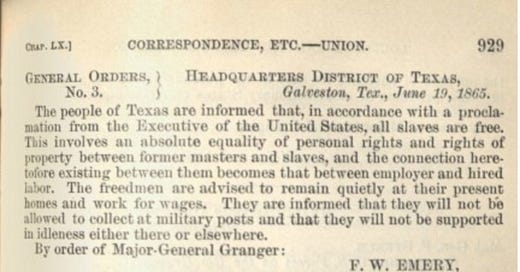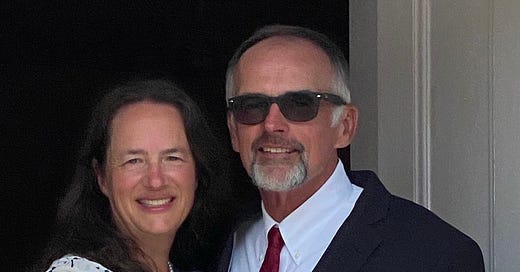
Tomorrow is the federal holiday honoring Juneteenth, the celebration of the announcement on June 19th, 1865, in Texas that enslaved Americans were free.
On April 9, 1865, General Robert E. Lee had surrendered his Army of Northern Virginia to General Ulysses S. Grant of the U.S. Army, but it was not until June 2 that General Edmund Kirby Smith surrendered the Confederacy’s Trans-Mississippi Department, the last major army of the Confederacy, to the United States, in Galveston, Texas. Smith then fled to Mexico.
Seventeen days later, Major General Gordon Granger of the U.S. Army arrived on Galveston Island with about 2000 U.S. troops. On June 19, Granger issued General Order Number 3, informing the formerly enslaved inhabitants of Texas that they were free.
“The people of Texas are informed that, in accordance with a proclamation from the Executive of the United States, all slaves are free,” it read. “This involves an absolute equality of personal rights and rights of property between former masters and slaves, and the connection heretofore existing between them becomes that between employer and hired labor.”
The order went on: “The freedmen are advised to remain quietly at their present homes and work for wages. They are informed that they will not be allowed to collect at military posts and that they will not be supported in idleness either there or elsewhere.”
General Order Number 3 informed formerly enslaved people that they were freed from enslavement and the suffocatingly circumscribed lives, restricted movement, corporal punishment, and stunted lives to which the American system of human slavery had previously confined them. It urged them to join the free labor economy the North championed, working for wages and seamlessly shifting their former relations with their former enslavers to ones of employee and employer.
The news arrived in a state consumed by chaos. During the war, white men had gone east to join the Confederate armies as planters had rushed west from Louisiana with their enslaved people to try to preserve the institution of slavery. Mexicans and Comanches had launched raids against the unsettled population, and the long-horned cattle, bottled up in Texas as the United States blockaded southern ports and the railroad lines degraded, had multiplied until observers estimated there were eight cattle for every one person in Texas, and the animals threatened those who ventured too close to them.
The fall of the Confederacy meant the collapse of whatever order remained in the state, and former Confederates were demoralized and angry. “It looked like everything worth living for was gone,” cattleman Charles Goodnight later recalled. Planters furious at the death of their cause and desperate to get crops in refused to tell the enslaved people in the fields of the dramatic change in their circumstances with the surrender of the last major Confederate army.
Against this backdrop, Granger’s men read General Order Number 3 to formerly enslaved Texans in Galveston. They heard the news and celebrated in the streets. The order was no magic bullet for the state—on far-flung plantations, some enslavers tried to hold enslaved people at work until after the harvest—but the news of freedom on June 19 provided a focus and a rallying point for Black Americans to celebrate freedom that stood out and apart from the chaos and anger around them.
A year later, the Thirteenth Amendment abolishing enslavement except as punishment for a crime had been added to the U.S. Constitution, and on June 19, 1866, Texas freedpeople gathered to celebrate the coming of their freedom with prayers, speeches, food, and socializing.
By the following year, the federal government encouraged “Juneteenth” celebrations, eager to make sure Black citizens had an opportunity to discuss the voting rights that had been put in place by the Military Reconstruction Act in early March 1867, and the tradition of Juneteenth began to spread to Black communities across the nation.
Beginning there in Texas, the Black Americans celebrating Juneteenth emphasized that emancipation in the United States meant not just freedom from enslavement, but also freedom to shape the nation’s future.
—-
Notes:














As Rev. Al Sharpton said today, it should be a celebration for everyone, to celebrate how far we have come and to seriously consider what still needs to be done.
“Beginning there in Texas, the Black Americans celebrating Juneteenth emphasized that emancipation in the United States meant not just freedom from enslavement, but also freedom to shape the nation’s future.”
Yet, it’s devastatingly sad that these words still lack absolute veracity on so many levels — on both visible and invisible spectra.